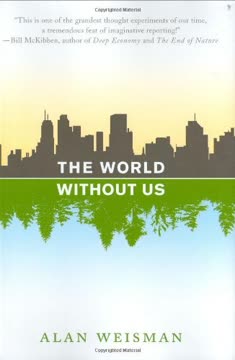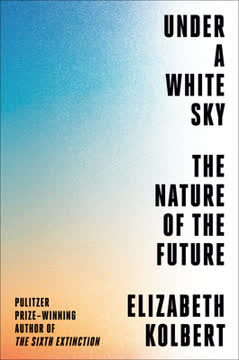Key Takeaways
1. Climate change is rapidly altering our planet, threatening the human game
We are putting the human game at risk, that is, from things going powerfully wrong and powerfully right.
Global warming's impacts are accelerating. The Earth has already warmed by about two degrees Fahrenheit, leading to more frequent and intense natural disasters. Extreme weather events like hurricanes, droughts, and wildfires are becoming more common and destructive. Sea levels are rising, threatening coastal communities and infrastructure.
Ecosystems are under stress. Climate change is causing mass extinctions, with species disappearing at an alarming rate. Coral reefs are bleaching, forests are dying, and entire habitats are shifting or disappearing. The oceans are becoming more acidic, threatening marine life and the food chains that depend on them.
Human society is at risk. Climate change is impacting food production, water availability, and human health. It's also exacerbating social and economic inequalities, potentially leading to increased conflict and mass migration. The speed and scale of these changes are unprecedented in human history, challenging our ability to adapt and threatening the stability of our civilization.
2. Technological advancements pose existential risks to humanity's future
We are messy creatures, often selfish, prone to short-sightedness, susceptible to greed.
AI and automation raise ethical concerns. As artificial intelligence becomes more advanced, it raises questions about job displacement, privacy, and the potential for autonomous weapons. There are also concerns about AI surpassing human intelligence and potentially becoming uncontrollable.
Genetic engineering carries risks. The ability to edit human genes opens up possibilities for eliminating diseases but also raises concerns about "designer babies" and increasing inequality. There are also risks of unintended consequences and the potential for biological weapons.
Technological dependence threatens human autonomy. As we become increasingly reliant on technology for daily functions, there's a risk of losing essential human skills and becoming vulnerable to technological failures or manipulation. The rapid pace of technological change also challenges our ability to adapt psychologically and socially.
3. Inequality and social division exacerbate environmental and technological challenges
Privilege lies in obliviousness.
Economic inequality is growing. The gap between the rich and poor is widening in many countries, with a small percentage of the population controlling an increasingly large share of wealth. This concentration of resources affects political power and decision-making.
Social divisions are deepening. Political polarization, racial tensions, and cultural conflicts are becoming more pronounced in many societies. These divisions make it difficult to build consensus and take collective action on global challenges.
Unequal impacts of climate change. The effects of climate change disproportionately affect poorer communities and countries, who often have the least resources to adapt. This inequality can lead to increased migration and conflict.
4. The fossil fuel industry's deception has delayed crucial climate action
If you think our world is unequal now, just imagine it stratified along both socioeconomic and genetic lines.
Deliberate misinformation campaigns. The fossil fuel industry has known about the dangers of climate change for decades but has actively worked to spread doubt and confusion about the science. This has delayed necessary action to reduce carbon emissions.
Political influence. The industry has used its wealth to influence politicians and policy-makers, often blocking or weakening environmental regulations. This has slowed the transition to renewable energy sources.
Economic entrenchment. The global economy remains heavily dependent on fossil fuels, making it difficult to transition quickly to cleaner energy sources. The industry's economic power continues to shape energy policies worldwide.
5. Genetic engineering and AI development require careful ethical consideration
Once technology enables us to re-engineer human minds, Homo sapiens will disappear, human history will come to an end, and a completely new process will begin, which people like you and me cannot comprehend.
Potential benefits and risks. Genetic engineering could eliminate diseases and enhance human capabilities, but it also raises concerns about unintended consequences and increasing inequality. AI could solve complex problems but also poses risks of job displacement and potential loss of human control.
Ethical dilemmas. These technologies raise profound questions about what it means to be human, the nature of consciousness, and the limits of human intervention in natural processes. There are concerns about creating a "post-human" future.
Regulatory challenges. The rapid pace of technological development outstrips our ability to create appropriate regulations and ethical frameworks. There's a need for global cooperation to address these challenges.
6. Nonviolent movements and renewable energy offer hope for positive change
Solar power is a miracle, or at least close enough for our purposes.
Power of nonviolent resistance. Historically, nonviolent movements have been effective in bringing about social and political change. These methods can be applied to current global challenges, mobilizing people to demand action on climate change and social justice.
Renewable energy revolution. The rapid development and decreasing costs of solar, wind, and other renewable energy sources offer a path to reduce carbon emissions. These technologies also have the potential to decentralize energy production and increase energy independence.
Grassroots initiatives. Local and community-led efforts to address environmental and social issues are growing worldwide. These initiatives demonstrate the power of collective action and offer models for sustainable living.
7. Preserving human meaning and solidarity is crucial in the face of global challenges
We live on a planet—we live on a planet. And it's infinitely more glorious than the others we head for at such risk and expense.
Maintaining human connections. In an increasingly digital and automated world, it's crucial to preserve meaningful human interactions and relationships. This includes fostering community, empathy, and cooperation.
Balancing progress and preservation. While embracing technological advancements, we must also value and protect natural systems, cultural heritage, and human diversity. This balance is essential for maintaining a rich and meaningful human experience.
Cultivating hope and resilience. In the face of daunting global challenges, it's important to cultivate hope and resilience. This involves celebrating human creativity, compassion, and the capacity for positive change. It also means recognizing the beauty and value of our planet and working to preserve it for future generations.
Last updated:
FAQ
What's Falter: Has the Human Game Begun to Play Itself Out? about?
- Climate Crisis Focus: The book examines the profound effects of human activity on the planet, particularly focusing on climate change and technological advancements.
- Technological Threats: Bill McKibben discusses the potential risks associated with emerging technologies, such as artificial intelligence and genetic engineering.
- Call for Action: It serves as a rallying cry for collective action to address climate change and the ethical implications of new technologies.
Why should I read Falter by Bill McKibben?
- Urgent Message: The book presents an urgent and compelling argument about the state of our planet and the choices we face.
- Thought-Provoking: It challenges readers to think critically about the implications of technological advancements and the moral responsibilities that come with them.
- Inspiring Activism: McKibben's writing is motivational, inspiring readers to take action in their communities and advocate for sustainable practices.
What are the key takeaways of Falter?
- Human Game at Risk: The "human game" is at risk due to climate change and technological advancements, highlighting the fragility of our existence.
- Inequality and Technology: Advancements in technology could deepen societal inequalities, creating a "GenRich" class.
- Need for Collective Action: McKibben emphasizes the importance of societal solidarity in addressing these challenges.
What are the best quotes from Falter and what do they mean?
- “The human experiment is now in question.”: This suggests humanity's future is uncertain due to our environmental and technological choices.
- “The game is beginning to falter.”: Indicates that the systems supporting human civilization are under threat, emphasizing the need for urgent action.
- “Resistance to these dangers is at least possible.”: Reflects McKibben's belief in the potential for change through activism.
How does Bill McKibben define the "human game" in Falter?
- Complexity of Human Experience: The human game encompasses culture, commerce, politics, and social life.
- Endangered State: It is endangered due to ecological destruction and technological advancements.
- Need for Dignity: The game should create dignity for its players, threatened by the current trajectory.
What role does technology play in Falter by Bill McKibben?
- Dual Threat: Technology is both a potential solution and a significant threat to humanity.
- AI as a Replacement: AI and automation may lead to a future where human jobs are obsolete.
- Need for Ethical Considerations: McKibben urges society to prioritize human values over technological advancement for its own sake.
How does Falter address the issue of inequality?
- Inequality and Climate Change: Rising inequality is connected with the impacts of climate change, affecting marginalized communities the most.
- Call for Justice: The book advocates for climate justice, emphasizing solutions that consider the needs of the most vulnerable.
- Historical Context: Provides historical examples of how inequality has shaped environmental policies and outcomes.
What solutions does Bill McKibben propose in Falter?
- Grassroots Movements: Emphasizes the importance of grassroots activism and collective action.
- Green New Deal: Supports initiatives like the Green New Deal to address climate change while promoting social equity.
- Personal Engagement: Encourages individuals to engage in local movements and make sustainable choices.
How does Falter view the future?
- Bleak Outlook: Warns that without significant changes, humanity faces dire consequences.
- Possibility of Change: Maintains that change is possible through activism and innovation.
- Engagement Over Despair: Stresses the importance of engagement rather than despair.
What is the significance of the title Falter?
- Indication of Crisis: Suggests that civilization is beginning to falter under ecological and technological pressures.
- Call to Action: Emphasizes the need for urgent action to prevent further decline.
- Reflection of Hope: Reflects McKibben's belief that resistance is possible.
What is the significance of CRISPR in Falter?
- Gene Editing Revolution: CRISPR allows for precise gene editing, with potential to eliminate genetic diseases.
- Potential for Inequality: Warns that CRISPR could lead to a new form of inequality, creating a society divided by genetic advantages.
- Need for Ethical Guidelines: Calls for robust public discourse on the ethical implications of CRISPR.
How does Falter relate to the concept of the "human game"?
- Defining the Human Game: Describes it as the ongoing struggle for survival, meaning, and connection.
- Interconnectedness of Humanity: Emphasizes the interconnectedness of all people and the importance of solidarity.
- Call for Reflection: Encourages readers to reflect on their role in the human game and the choices they make.
Review Summary
Falter receives mixed reviews, with ratings ranging from 2 to 5 stars. Many praise McKibben's passionate writing and comprehensive overview of climate change, AI, and genetic engineering threats. Critics find the book alarmist and unfocused. Readers appreciate McKibben's analysis of Ayn Rand's influence on modern politics and economics. Some feel the proposed solutions are insufficient given the scale of the problems described. Overall, reviewers agree the book is thought-provoking and important, even if they don't fully agree with all of McKibben's arguments.
Similar Books







Download PDF
Download EPUB
.epub digital book format is ideal for reading ebooks on phones, tablets, and e-readers.






